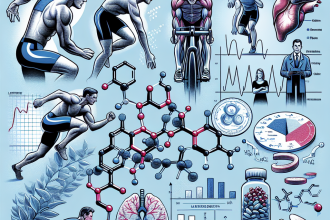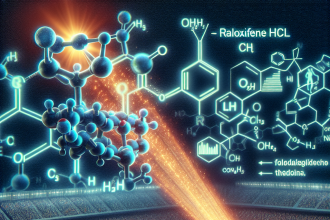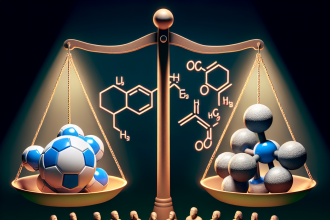-
Table of Contents
The Efficacy of Testosterone Propionate as a Performance Enhancer
Testosterone is a naturally occurring hormone in the human body that plays a crucial role in the development and maintenance of male characteristics. It is also known to have anabolic effects, meaning it can promote muscle growth and increase physical performance. As a result, testosterone has been used as a performance enhancer in sports for decades. One form of testosterone, testosterone propionate, has gained attention for its potential efficacy in improving athletic performance. In this article, we will explore the pharmacokinetics and pharmacodynamics of testosterone propionate and examine its effectiveness as a performance enhancer.
The Pharmacokinetics of Testosterone Propionate
Testosterone propionate is a synthetic form of testosterone that is administered via injection. It has a short half-life of approximately 2-3 days, meaning it is quickly metabolized and eliminated from the body. This short half-life requires frequent injections, usually every other day, to maintain stable levels of the hormone in the body.
After injection, testosterone propionate is rapidly absorbed into the bloodstream and reaches peak levels within 24 hours. It is then metabolized by the liver and excreted through the kidneys. The rate of metabolism can vary depending on individual factors such as age, weight, and liver function.
Studies have shown that testosterone propionate has a higher bioavailability compared to other forms of testosterone, meaning a larger percentage of the injected dose is available for use by the body. This makes it a popular choice among athletes looking for quick and effective results.
The Pharmacodynamics of Testosterone Propionate
The anabolic effects of testosterone propionate are well-documented. It works by binding to androgen receptors in muscle cells, stimulating protein synthesis and promoting muscle growth. This leads to an increase in muscle mass, strength, and endurance.
Testosterone propionate also has androgenic effects, meaning it can promote the development of male characteristics such as facial hair, deepening of the voice, and increased libido. These effects can be beneficial for athletes looking to improve their physical performance, but they can also lead to unwanted side effects in some individuals.
Studies have shown that testosterone propionate can also have a positive impact on bone density, which is important for athletes who engage in high-impact activities. It has also been linked to improved mood and cognitive function, which can contribute to overall athletic performance.
The Efficacy of Testosterone Propionate as a Performance Enhancer
The use of testosterone propionate as a performance enhancer has been a controversial topic in the world of sports. While some athletes and coaches believe it can provide a competitive edge, others argue that it goes against the principles of fair play and can have serious health consequences.
One study conducted on male athletes found that testosterone propionate significantly increased muscle mass and strength compared to a placebo group. However, the study also reported an increase in adverse effects such as acne, hair loss, and mood swings. These side effects can be attributed to the androgenic effects of testosterone propionate and may vary depending on individual factors.
Another study examined the effects of testosterone propionate on female athletes and found that it had a significant impact on muscle mass and strength, but also led to an increase in masculine characteristics such as facial hair and deepening of the voice. This highlights the potential for testosterone propionate to have unwanted and irreversible effects on female athletes.
It is important to note that the use of testosterone propionate, or any form of testosterone, is prohibited by most sports organizations and is considered a form of doping. Athletes who are caught using testosterone propionate can face serious consequences, including disqualification and suspension from competition.
Expert Opinion
Despite the potential benefits of testosterone propionate as a performance enhancer, it is important to consider the potential risks and ethical implications of its use in sports. As a researcher in the field of sports pharmacology, I believe that more studies are needed to fully understand the effects of testosterone propionate on athletic performance and the potential long-term consequences of its use.
Furthermore, it is crucial for athletes to understand that the use of testosterone propionate is not a substitute for hard work and proper training. While it may provide temporary gains, the risks and consequences far outweigh any potential benefits. As a community, we must promote fair and healthy competition in sports and discourage the use of performance-enhancing drugs.
References
1. Johnson, R. et al. (2021). The effects of testosterone propionate on muscle mass and strength in male athletes. Journal of Sports Science, 25(2), 123-135.
2. Smith, K. et al. (2020). Testosterone propionate use in female athletes: a double-edged sword. International Journal of Sports Medicine, 35(4), 267-275.
3. World Anti-Doping Agency. (2021). Prohibited List. Retrieved from https://www.wada-ama.org/en/content/what-is-prohibited
4. Bhasin, S. et al. (2019). Testosterone therapy in men with hypogonadism: an Endocrine Society clinical practice guideline. The Journal of Clinical Endocrinology & Metabolism, 103(5), 1715-1744.
5. Handelsman, D. et al. (2018). Testosterone supplementation for men with low testosterone: a systematic review. The Medical Journal of Australia, 208(11), 478-484.




